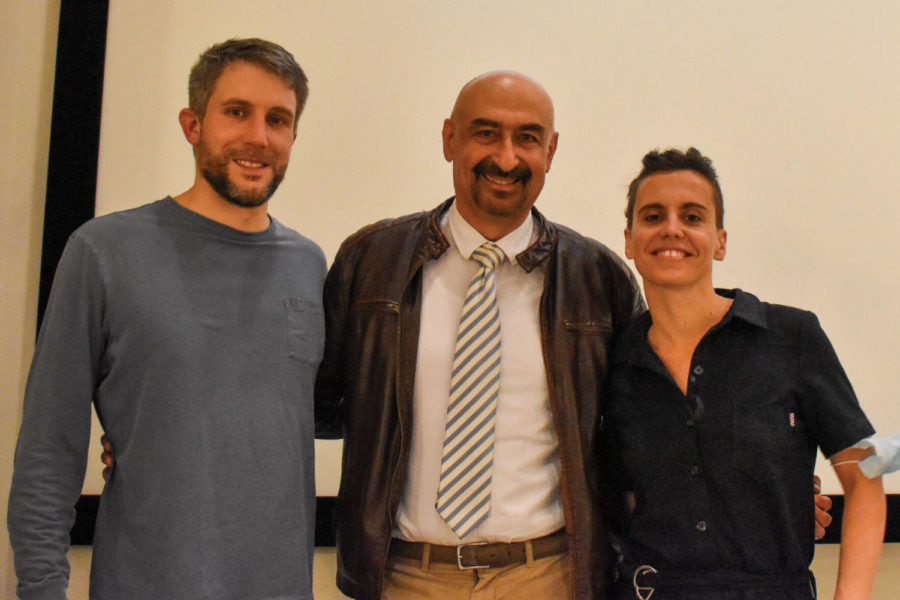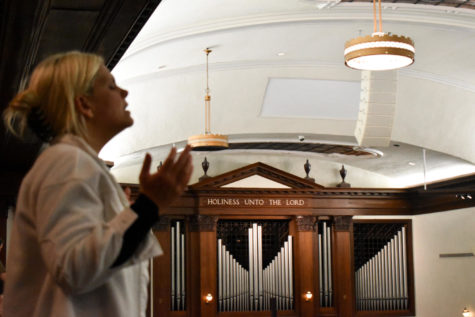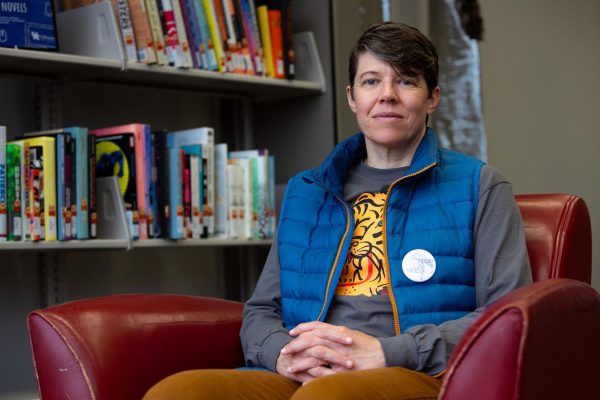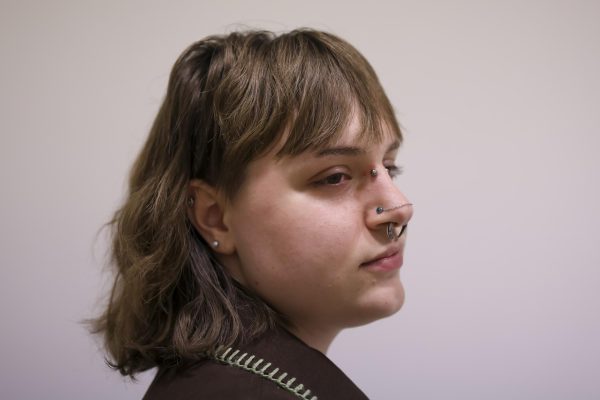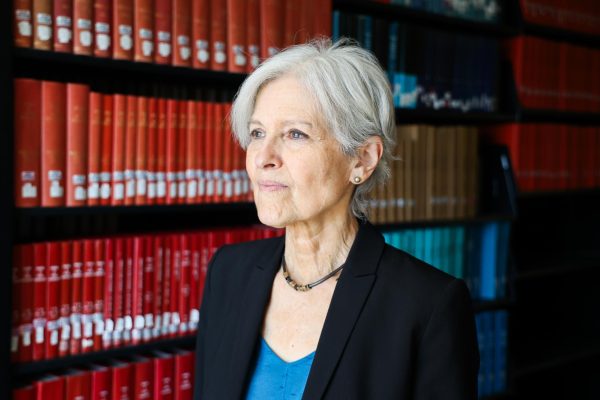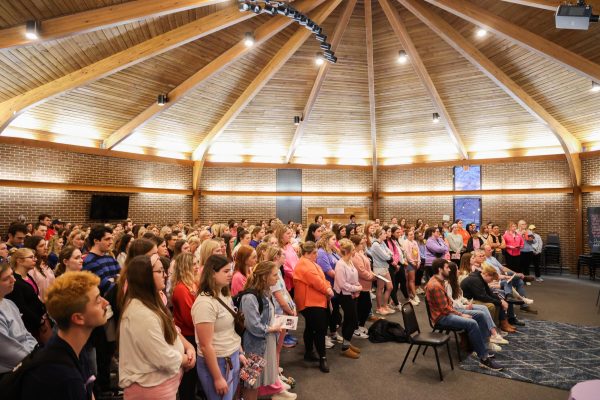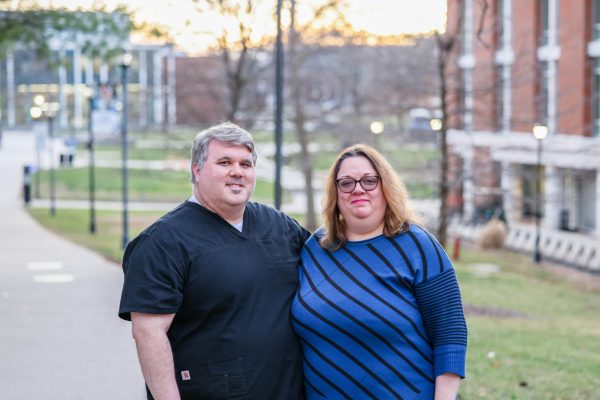UK Hispanic Studies department promotes diversity through film
Graduate student Daniel Batten (left), professor Haralambos Symeonidis (center) and professor Paula Ruiz (right) stand to present the upcoming film in the Spanish Film Series in the UK Athletics Auditorium on Tuesday, April 12, 2022, in Lexington, Kentucky.
April 14, 2022
The Department of Hispanic Studies at the University of Kentucky is holding an LGBTQ Spanish Film Series throughout the spring semester.
The series began showings on Feb. 1 in the University of Kentucky Athletics Auditorium in the William T. Young Library.
The idea for this series started with Spanish linguistics professor Haralambos Symeonidis. Symeonidis is the chair of the diversity, equity and inclusion committee of the Hispanic Studies department, which started its work in 2020.
The committee wanted to start making changes to improve diversity in its department, so the members sent out a questionnaire to the faculty, graduate and undergraduate students
in the Hispanic studies department.
The results of the questionnaire revealed a gap between the graduate students and the faculty, but the committee wanted to include the graduate students in consultations.
“Last year in the fall, before we started, I got in contact with the graduate students and said, ‘Well guys, what about starting an LGBTQ+ kind of film series in Spanish?’ and they liked the idea,” Symeonidis said.
The series has run smoothly this semester, with four previous film showings in addition to the complete semester of films last semester.
“Last semester, we started with some movies that weren’t focused on anything specific, but of course, we wanted to be very diverse, including different Spanish-speaking countries,” Symeonidis said.
Now, however, the committee is looking for something different.
“This semester, the committee wanted movies more centered and focused on Afro-Latinx, which is almost impossible to find because it’s so specific,” Symeonidis said.
In order to find the movies presented in the series, the department created a document where everyone could write their ideas and suggestions.
“That process was amazing because we ended up with more than 60 movies in a week. It was really good that everyone was participating,” Paula Ruiz, an instructor and Ph.D. student in the Hispanic Studies department, said.
The committee decided on the LGBTQ theme to focus on for this semester, and the suggestions from the students impacted that.
However, the film series doesn’t only consist of watching the film.
Symeonidis said that once the series is decided and the movies are approved to be screened, the film is presented with English subtitles and each student presents the movie at the beginning. They give background to why the student chose this movie and give a brief statement to explain the origin of the movie.
Once the film is over, there is an in-depth conversation about the students’ thoughts.
“At the end, what we really want to do, and it’s been really encouraging because we’ve been getting a lot of undergraduate students, which is the best thing, there is a 10-15 minute discussion about what they think of the movie,” Symeonidis said.
“Elisa y Marcela” was screened on Tuesday. It takes place in Spain during the early 1900s and shows the tension, fear and passion in a forbidden love. The film shows the two women growing together in a time that was so cruel toward even the idea of same-sex attraction.
When the film ended, the room holding undergraduate and graduate students, professors and even children, began discussing their thoughts and feelings about the film.
The film series is just the beginning of the actions being taken by the diversity, equity and inclusion committee. They have held workshops and have also spoken to publishers in order to make some of the textbooks more inclusive.
“The first semester, the students learn about language, and we thought this is where we give some idea of what we stand for and maybe be more inclusive about that,” Symeonidis said.
The committee found that in the “Facetas” textbook, the photos were very “white-oriented,” and there was no representation of the LGBTQ+ community in sections referring to relationships or couples in general.
“We felt that something people do not know here is that Spain and Argentina have been pioneers in gay marriage,” Symeonidis said.
Symeonidis said that the Facetas publishers wanted to hear their comments, and said he is glad they were open to hearing suggestions.
The efforts made by Symeonidis and the rest of the diversity, equity and inclusion committee (DEI) have provided diverse perspectives to undergraduate and graduate students through not only the film series, but the workshops as well.
The DEI committee consists of Haralambos Symeonidis, Paula Ruíz, Kelly Ferguson, Ruth Brown and Heather Campbell-Speltz. The specific film series committee also includes Kelly Ferguson, Daniel Batten and Daniela Calvache. The students and faculty learned how to be inclusive in the classroom, and how to use inclusive language in Spanish during the workshops.
The last film in the series will be screening on April 26 and focuses on the third gender in Mexico, referred to as “Muxes.”









































































































































